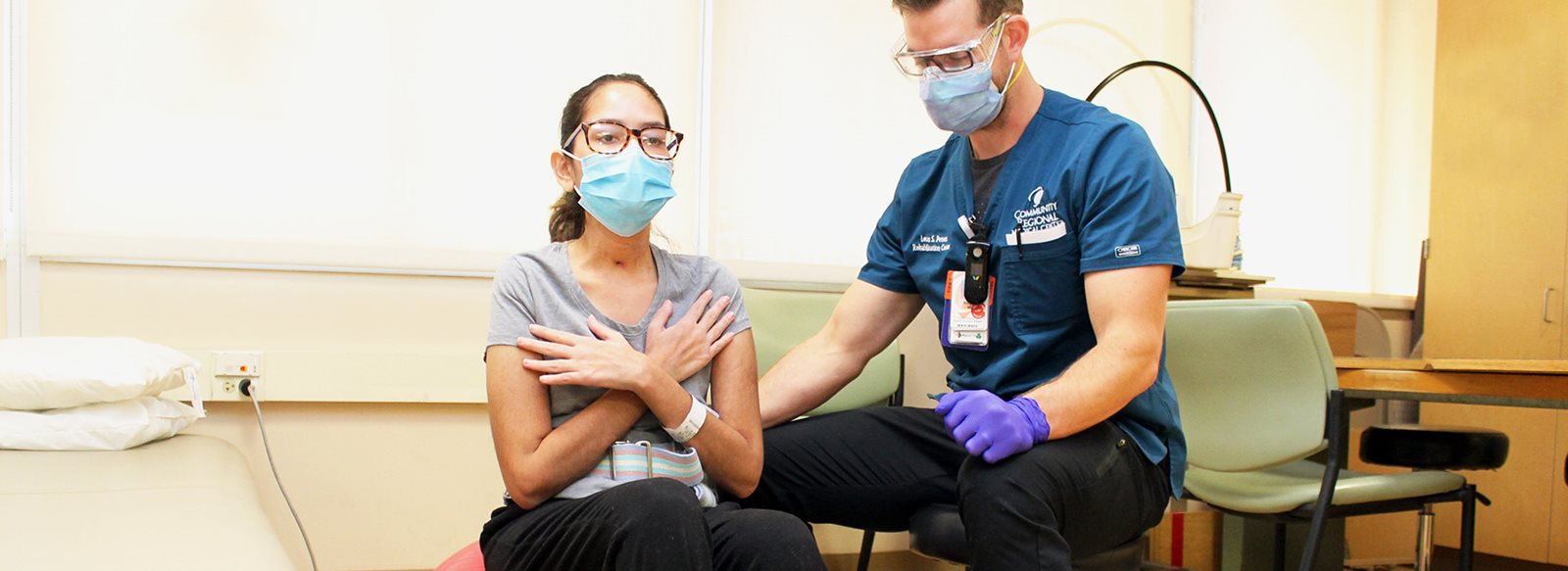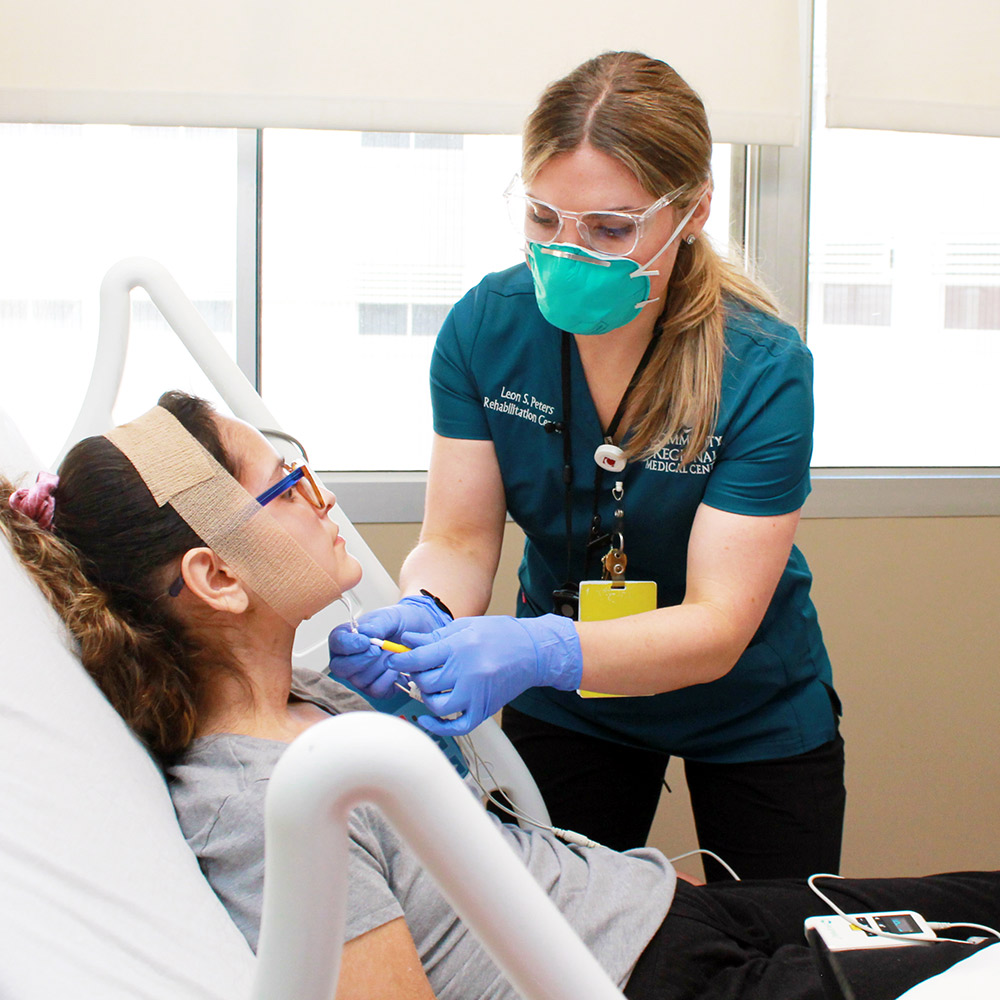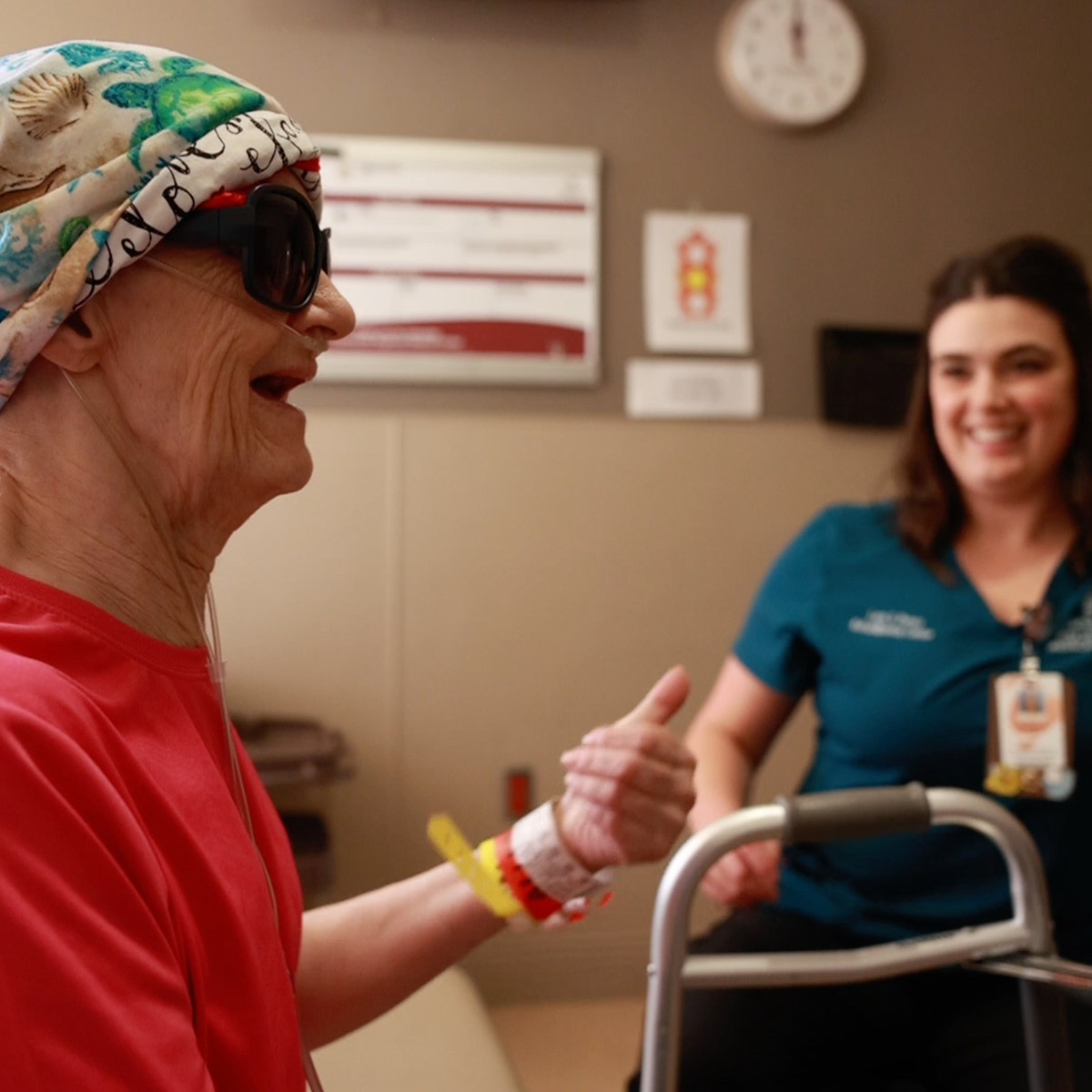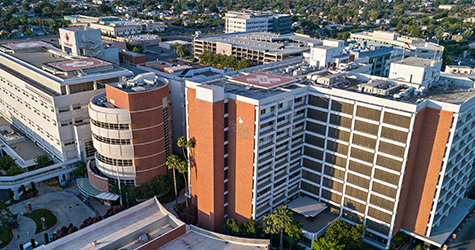
Inpatient rehabilitation services conducted at the Leon S. Peters Rehabilitation Center take place in a 24-hour facility located at Community Regional Medical Center in Fresno.
For over 50 years, residents of the Central Valley and beyond have counted on Community’s inpatient rehabilitation services to help them recover from life-changing events like trauma, stroke, burn, spinal cord injury and more.
Patients at the Leon S. Peters Rehabilitation Center benefit from being within our acute care hospital — home to the only Level I Trauma Center between Los Angeles and Sacramento. This means specialists are readily available to consult on your care plan without you ever having to leave the rehabilitation floor.
Transition From Hospital to Inpatient Care
While in the hospital, your care team will assess you to determine if acute inpatient rehabilitation is needed.
If inpatient care is required, your doctor will refer you to our registered nurse (RN) liaisons. These highly skilled RN liaisons work together with your caregivers, family, physician, case manager and insurance provider to facilitate transition to our inpatient rehabilitation program.
Individualized Treatment Plan
Once admitted to the Leon S. Peters Rehabilitation Center, our team of dedicated professionals will evaluate you. This may include consultations with:
- Board-certified physiatrists (physical medicine and rehabilitation doctors)
- Therapists (physical, occupational, speech-language, recreational, respiratory)
- Nursing staff
- Licensed clinical social workers
- Dieticians
- Pharmacists
- Case managers
Through this collaboration, a treatment plan will be tailored to meet your specific needs.
You'll be closely monitored by a physician during daily evaluations, while an interdisciplinary care team will meet weekly to discuss your progress. Depending on your specific diagnosis, they’ll be addressing things such as:
Pain management
Bowel and bladder function
Sleep
Management of chronic conditions (such as diabetes, hypertension, spasticity, etc.)
Registered nurses and nursing assistants will provide around-the-clock care, making sure to follow your physician's care plan and attending to your needs — all in your own private room. They’ll also manage medications and wound care.
Therapy Services to Help Reach Your Goals
 Individualized therapy services totaling 3 hours per day will be provided. Your therapy schedule may include a combination of physical, occupational and speech-language pathology, addressing issues like:
Individualized therapy services totaling 3 hours per day will be provided. Your therapy schedule may include a combination of physical, occupational and speech-language pathology, addressing issues like:
Mobility: bed mobility, transfers, standing and/or walking
Daily activities: dressing, eating, grooming, bathing
Cognition: memory, concentration, problem solving, judgment
Communication
Swallowing
Bowel & bladder function
Assessing for equipment needed at home
Providing caregiver education and training to assure a safe transition home
Discharge Home and Continuity of Care
After completing inpatient rehabilitation, you’ll be referred to either our outpatient services or home health services to continue your journey towards recovery. Our experienced case management team will assist in scheduling follow-up appointments with primary care physicians and specialists, ensuring a seamless continuation of care.
How Can We Help You?
Below are some of the treatments and therapies we provide at Leon S. Peters Rehabilitation Center.
A traumatic brain injury occurs when the head or body undergoes direct or indirect trauma. Brain injuries can vary in severity — falling anywhere on the spectrum from mild to severe. Each brain injury is distinct, affecting patients in different ways.
We’re proud to include among our staff physical therapists, occupational therapists, speech language pathologists, and registered nurses who hold the esteemed Certified Brain Injury Specialist (CBIS) certification from the Brain Injury Association of America. To earn this certification, our specialists complete over 500 hours of supervised work with brain injury patients and successfully pass a rigorous examination.
We also have specialists who are trained in neuromuscular electrical stimulation (NMES) and surface electromyography (sEMG) for treatment and management of dysphagia, or difficulty swallowing.
Ongoing support
To aid in your recovery, we offer a monthly support group specifically tailored to address the unique challenges and experiences of patients affected by brain injury, as well as their caregivers.
These supportive sessions take place on the fourth Tuesday of every month at Community Regional Medical Center. If you would like to join the email list, call (559) 459-6296.
After a total joint replacement, traumatic event or musculoskeletal injury (affecting bones, joints, muscles or nerves), you may have impaired mobility and function. We help our patients function safely while allowing their bodies to heal.
Being located within our Level I Trauma Center means orthopedic surgeons are nearby if needed.
Being located within our Level I Trauma Center means orthopedic surgeons are nearby if needed.
A spinal cord injury can result from various causes such as direct trauma, tumor or insufficient blood flow as a result of blocked arteries. These can lead to complete or partial paralysis and a loss of sensation below the site of injury. It’s important to recognize that each spinal cord injury is distinctive, impacting patients in diverse ways. Therefore, your treatment at Leon S. Peters Rehabilitation Center will be tailored to your specific injury and needs.
Ongoing support
We understand the importance of ongoing support for individuals with a spinal cord injury diagnosis, as well as their caregivers and family members. We offer a monthly support group specifically to address the unique challenges and experiences of those affected by spinal cord injury. These supportive sessions take place on the third Wednesday of every month at Community Regional Medical Center. To join our email list and receive updates about upcoming support group meetings, please contact us at (559) 459-6296.
A stroke occurs when the blood supply to a part of the brain is blocked or a blood vessel in the brain bursts. This can result in an injury to the brain that causes impairments in mobility, activities of daily living, communication, swallowing and cognition (thinking, learning, memory, etc.).
It’s common to have swallowing issues, or dysphagia, after a stroke. Our speech language pathologists are dysphagia-certified to perform fiberoptic endoscopic evaluation of swallowing (FEES) and videofluoroscopic swallow studies (VFSS). These studies allow the speech language pathologist to assess your swallow function to determine if there are any problems when food and liquid pass through the throat.
Additionally, a significant number of our physical and occupational therapists have achieved the esteemed Certified Stroke Rehabilitation Specialist Certification (CSRS) — the only certification in the field dedicated to stroke rehabilitation. This certification requires completion of a rigorous training course and examination plus commitment to ongoing education and participating in annual maintenance programs to ensure knowledge and skills remain current.
These sessions take place on the third Tuesday of every month at Community Regional Medical Center. If you would like to join our email list and receive updates about the stroke support groups, please contact us at (559) 459-6296.
It’s common to have swallowing issues, or dysphagia, after a stroke. Our speech language pathologists are dysphagia-certified to perform fiberoptic endoscopic evaluation of swallowing (FEES) and videofluoroscopic swallow studies (VFSS). These studies allow the speech language pathologist to assess your swallow function to determine if there are any problems when food and liquid pass through the throat.
Additionally, a significant number of our physical and occupational therapists have achieved the esteemed Certified Stroke Rehabilitation Specialist Certification (CSRS) — the only certification in the field dedicated to stroke rehabilitation. This certification requires completion of a rigorous training course and examination plus commitment to ongoing education and participating in annual maintenance programs to ensure knowledge and skills remain current.
Ongoing support
We understand the importance of ongoing support for individuals with a stroke diagnosis, as well as their caregivers and family members. We offer a monthly support group designed specifically for those affected by stroke, as well as their support networks.These sessions take place on the third Tuesday of every month at Community Regional Medical Center. If you would like to join our email list and receive updates about the stroke support groups, please contact us at (559) 459-6296.
Community Regional Medical Center is home to the only verified comprehensive burn center between Los Angeles and Sacramento. As a patient at Leon S. Peters Rehabilitation Center, you’re within our Level I Trauma Center with specialists available to consult on a plan of care — all without the need to leave the rehabilitation floor.
In addition to daily evaluations performed by our physiatry team, the burn team will continue to assess you with weekly evaluations to assure there is appropriate skin healing.
In addition to daily evaluations performed by our physiatry team, the burn team will continue to assess you with weekly evaluations to assure there is appropriate skin healing.
Amputations occur for a variety of reasons, including trauma, peripheral artery disease, and infection of the soft tissue and underlying bone. Approximately 1.6 million Americans are living with an amputation — each facing a wide range of physical, emotional, psychological and social challenges.
In addition to regular daily evaluations performed by our physiatry team, you’ll be monitored to prevent contracture (tightness that limits movement) and make sure everything is healing properly.
Therapy for amputation will include, if necessary, custom wheelchair evaluation and resources for prosthesis.
In addition to regular daily evaluations performed by our physiatry team, you’ll be monitored to prevent contracture (tightness that limits movement) and make sure everything is healing properly.
Therapy for amputation will include, if necessary, custom wheelchair evaluation and resources for prosthesis.
We treat weakness or debility from prolonged hospitalizations from medically complex procedures arising from cardiac conditions, pulmonary disease and cancer.
In addition to regular daily evaluations performed by our physiatry team, you’ll be monitored for spasticity (involuntary spasms or contraction of the muscles) and muscle tone. If necessary, you’ll receive bladder and bowel training.
As a patient at Leon S Peters Rehabilitation Center, you’ll be within our Level I Trauma Center, with access to specialists in neurology, orthopedics, nephrology, cardiology, infectious disease and more.
In addition to regular daily evaluations performed by our physiatry team, you’ll be monitored for spasticity (involuntary spasms or contraction of the muscles) and muscle tone. If necessary, you’ll receive bladder and bowel training.
As a patient at Leon S Peters Rehabilitation Center, you’ll be within our Level I Trauma Center, with access to specialists in neurology, orthopedics, nephrology, cardiology, infectious disease and more.
We use cookies and other tools to optimize and enhance your experience on our website. View our Privacy Policy.



